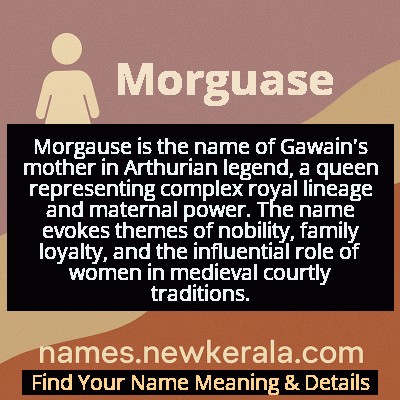Morguase Name Meaning & Details
Origin, Popularity, Numerology Analysis & Name Meaning of Morguase
Discover the origin, meaning, and cultural significance of the name MORGUASE. Delve into its historical roots and explore the lasting impact it has had on communities and traditions.
Name
Morguase
Gender
Female
Origin
Arthurian
Lucky Number
9
Meaning of the Name - Morguase
Morgause is the name of Gawain's mother in Arthurian legend, a queen representing complex royal lineage and maternal power. The name evokes themes of nobility, family loyalty, and the influential role of women in medieval courtly traditions.
Morguase - Complete Numerology Analysis
Your Numerology Number
Based on Pythagorean Numerology System
Ruling Planet
Mars
Positive Nature
Generous, passionate, energetic, and humanitarian.
Negative Traits
Impulsive, impatient, moody, and can be overly emotional.
Lucky Colours
Red, maroon, scarlet.
Lucky Days
Tuesday.
Lucky Stones
Red coral, garnet.
Harmony Numbers
1, 2, 3, 6.
Best Suited Professions
Military, sports, philanthropy, leadership roles.
What People Like About You
Courage, energy, leadership, generosity.
Famous People Named Morguase
Morgause of Orkney
Arthurian Queen
Mother of Gawain and key figure in Arthurian family politics
Queen Morgause
Literary Character
Half-sister to King Arthur in medieval romance tradition
Morgause le Fay
Arthurian Noblewoman
Central character in modern feminist retellings of Arthurian legend
Name Variations & International Equivalents
Click on blue names to explore their detailed meanings. Gray names with will be available soon.
Cultural & Historical Significance
Her character evolves significantly across traditions, from minor figure in early Welsh texts to complex personality in later versions. The infamous episode with Arthur resulting in Mordred's conception adds layers of tragedy and moral complexity. Morgause represents the often-overlooked feminine perspective in chivalric literature, bridging the magical world of her sister Morgan le Fay and political realities of Arthur's court. Her murder by her son Gaheris underscores the cycle of violence destroying Arthur's kingdom, making her a symbol of both maternal power and tragic destiny.
Extended Personality Analysis
Morgause embodies royal dignity, maternal strength, and political sophistication. As queen and mother of prominent knights, she demonstrates keen political understanding and courtly intelligence. Her personality reflects noblewomen's complex position in medieval society—bound by duty yet wielding significant influence through sons and royal connections. She shows pragmatic intelligence navigating Arthur's dangerous court while maintaining Orkney's power base, displaying both nurturing instincts and calculated political maneuvering.
Modern interpretations explore her psychological depth as a woman torn between loyalties to husband, sons, and royal brother. She exhibits resilience facing political turmoil and personal tragedy, yet her actions reveal moral ambiguity. The character embodies tension between personal desire and royal responsibility, showing deep maternal bonds with Gawain while navigating complicated sibling dynamics with Arthur. Her relationships illustrate how family ties were constantly tested by power struggles in Arthurian world, making her both sympathetic and formidable figure in medieval literature.
Modern Usage & Popularity
The name Morgause remains exceptionally rare in contemporary usage, primarily confined to literary contexts and Arthurian enthusiasts. It has never appeared in official baby name rankings in English-speaking countries, maintaining its status as distinctly historical and literary. Modern usage is almost exclusively limited to fictional characters in Arthurian retellings, fantasy literature, and occasional role-playing game contexts. The name's complexity and association with morally ambiguous characters present challenges for mainstream adoption, though it occasionally surfaces in artistic or literary circles valuing its Arthurian heritage. Some fantasy authors have adapted the name for original characters, but it remains firmly anchored to medieval origins rather than evolving into popular modern usage.
Symbolic & Spiritual Meanings
Morgause symbolizes the intricate relationship between maternal authority, royal power, and familial bonds in medieval literature. She represents the contradictory expectations placed on noblewomen—to embody both nurturing motherhood and political acumen. Her character serves as a symbol of generational continuity that simultaneously supports and threatens Arthur's kingdom, evoking themes of sisterhood and the subtle influence women wielded in patriarchal societies. Morgause also embodies the consequences of ambition and how personal relationships become entangled with political destiny, making her a metaphor for the ways family dynamics shape historical narratives and the tragic interplay between love and power in Arthurian legend.

